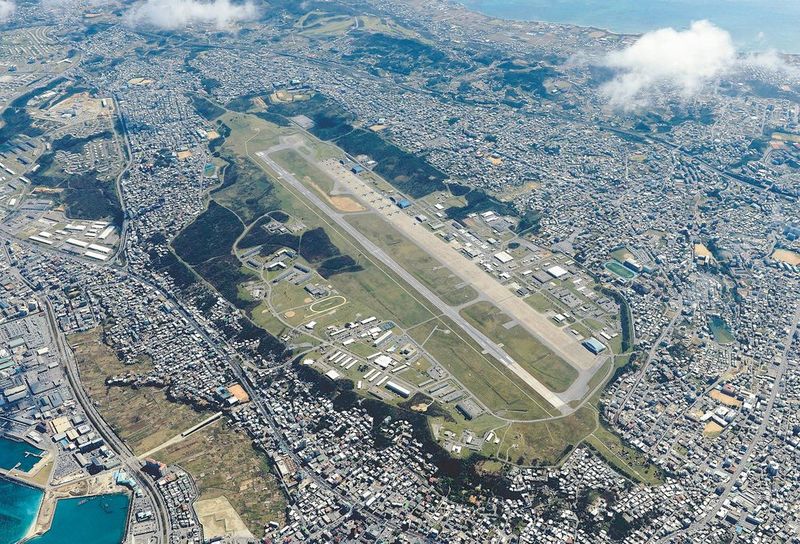In a historic decision, Japanese Prime Minister Shinzo Abe has accepted a court-mediated settlement to halt the construction of the American military base in Henoko. The victory for the local anti-base movement signals the first time in history that the federal government has sided against American military interests. However, given the back-and-forth nature of this political fiasco, the decision could very well only be temporary.
The construction of the Henoko base was part of the larger plan for relocation of the Marine Corps Air Station Futenma. Geography is a crucial element in this exchange. The airbase rests in the center of the heavily populated city of Ginowan City in the prefecture of Okinawa. The plans detailed the transfer of some 5,000 marines to a to-be-expanded facility in Henoko, a sparsely populated island, located also within the Okinawa prefecture. The halting of the its construction therefore stops the relocation in its tracks.
This debate on construction has been ongoing for decades. In 1996, the Defense Policy Review Initiative first recommended relocation in order to reduce military impact to the densely populated communities of southern Okinawa. The report came after the rise of the Okinawan anti-basing movement following the gang rape of a 12 year old local by three American servicemen a year before [1]. The transfer to Henoko became a prerequisite for the broader American rebalancing to Guam as part of Obama’s Pivot to Asia.
Opposition to the Futenma Replace Facility (FRF) quickly arose. While anti-basers want the marines expelled from Okinawa completely, they themselves have distinct interests. The environmentalists fear that the Henoko replacement facility could damage the fragile coral reefs and dugong populations along the island’s shore. The anti-militarists hate the cooptation of their government by the United States and call for pacifism. The US military fears Chinese ballistic missile attacks. In an interview, Professor T.J. Pempel of Political Science at UC Berkeley and former Marine who has over 30 years of experience and 24 books on Japan noted that even within the military, the Marine Corps was particularly opposed to the relocation as it would place them under the chain of command of the Navy.
Okinawa holds crucial importance for American military strategy. It is a vital display of commitment to the security of not only Japan, but the entire region. Its proximity to the Taiwan Strait as well as the Korean peninsula allows it to prevent flashpoints of conflict and act as a deterrent against North Korean and Chinese aggression.
Countless petitions, marches and rallies have been led in Okinawa. The “All Okinawa Kaigi” organization held protests outside the courts on March 1st particularly in anger at the abuse of power demonstrated by the central government. The AOK and similar factions act as umbrella organizations composed as a coalition of the various interest groups tied by their rejection of the base.
The anti-base movement seemed to reach its apex in 2009 elections when the Democratic Party of Japan swept the ruling Liberal Democratic Party and brought in Prime Minister Yukio Hatoyama, whose campaign rested on the closure of the Futenma airbase. But even he eventually discarded his promise and came out in support of the Henoko replacement facility.
The pendulum seemed to have swung back until Abe’s decision. In 2013, Okinawa Governor Hirokazu Nakaima approved the application submitted by the Japanese Defense Ministry for the construction of the Henoko base. In January of this year, pro-relocation Atsushi Sakima won the Okinawan mayoral election over his anti-base rookie challenger Keiichiro Shimura. Even Abe hailed his victory.
Given the extreme pressure from his own Tokyo supporters, the American military, and the businesses that rely on them, it is unlikely that Abe’s decision is the nail in the coffin that anti-basers have wanted for over a decade. Pempel believes that given the base’s tumultuous history, Abe’s decision signalled more a temporary resignation than a change of heart. The move may have been an effort to buy votes before elections this summer. Local Okinawans have already denounced it as a political tactic to push even harder while legislators relaxed after the deal.
However, the geopolitical climate could easily shift as interest in fortified bases dwindles in the transition to strategy emphasizing rotational deployment and offshore basing. Especially after another daunting case of sexual assault has headlined Okinawan newspapers in March, the controversy is far from over.
[1] The U.S. Military Presence in Okinawa and the Futenma Base Controversy, Congressional Research Service, https://www.fas.org/sgp/crs/row/R42645.pdf
Featured Image Source: Chiang Rai Times






Be First to Comment